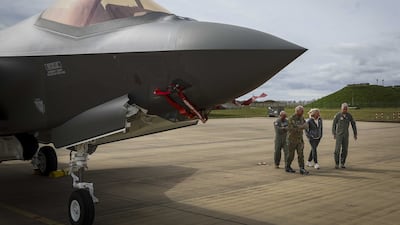Live updates: Follow the latest news on Israel-Gaza
Human rights groups in the Netherlands have taken the Dutch government to court in an attempt to put an end to exports of F-35 fighter jet components to Israel, arguing that the state is violating its own ban on weapons exports when there is a risk of breaches of humanitarian law.
Speaking on Monday at the end of the trial's first hearing in The Hague, Michiel Servaes, president of Oxfam Novib, the Dutch affiliate of the international charity, said that the case “went beyond the export of fighter jets' spare parts”.
“We are also asking the judge to make it clear that governments [must] be held accountable for their double standards,” Mr Servaes told The National.
“All the big language used on Ukraine and Russia – they are not doing it now. I think it's important that it's corrected.”
The trial, set to last two weeks, started as Israel ordered people out of large parts of the main southern city in the Gaza Strip as it pressed its ground campaign deep into the south of the enclave.
More than 15,500 Palestinians have died in Israel's bombing campaign since October 7, according to local authorities. The military operation, supported by fighter jets, is Israel's response to a Hamas-led attack that killed 1,200 people.
There has been no formal judgment establishing that Israel has violated international humanitarian law in the past weeks but concerns have been repeatedly voiced by UN senior officials as Israel withholds water, fuel and electricity supplies to the enclave while also bombarding heavily populated areas. Israel rejects the accusations and says it warns civilians before strikes.
Top US officials have also recently raised concerns over Israel's military tactics, yet such warnings from its closest ally seem to have had little impact on the government, which resumed its intense bombardment of Gaza on Friday after a seven-day truce expired.
Oxfam, which was supported in the Dutch court case by peace organisation Pax and NGO The Rights Forum, argues that such concerns should be enough for the state to suspend the exports of F-35 components to Israel because there is a risk that they will be used in a way that violates international humanitarian law.
“We are not asking for a formal recognition of violations but an acknowledgement that there is a risk,” said Mr Servaes.
“The basic question the judge needs to answer is: should the Dutch government abide by its own rules and by the international treaties they signed up to?
“Our view is that if there is a risk of violations, the permits should be withdrawn.”
The Netherlands houses one of several regional warehouses for US-owned F-35 parts which are distributed to countries that request them, including Israel.

The Netherlands is also bound by EU's common position on arms exports, which includes a clause on respect for human rights and international humanitarian law in the country of final destination.
Dutch newspaper NRC revealed last month that the government had ignored warnings from the customs office and the Foreign Affairs Ministry that arms exports to Israel after October 7 may violate international humanitarian law.
The Dutch government used its veto on arms exports to Israel 29 times between 2004 and 2020, according to NRC, which quoted unnamed government sources as saying they feared a veto this time would damage relations with Israel and the US.
Few European leaders have publicly condemned Israel's military operation, prompting accusations of double standards from the Middle East and the Global South.
Western leaders had been keen to rally support from the Global South to condemn Russia's full-scale invasion of Ukraine last year but are now widely criticised for not speaking out against Israel's apparent war crimes.
Lawyers for the Dutch state said they have considered the risks of allowing exports to proceed and weighed them along with other factors, including Israel's right to self-defence.
Speaking in court, lawyer Reimer Veldhuis said it was “legitimate” to wonder whether Israel's reaction to Hamas had gone too far.
“But an answer to that question cannot be easily given,” Reuters quoted him as saying.
“The suffering of the people of Gaza is great, and the state does not minimise that. But the law that governs armed conflict is not a simple calculation.”
He said that it was in the Netherlands' broader security and political interests to follow through on obligations and continue the shipments – which could be routed from other warehouses.
Lawyers defending the state also said that exports are covered by a general export permit established in 2016, said Mr Servaes, who dismissed the argument as unconvincing.
“It's crystal clear you will need to test it specifically for how these aeroplanes are used,” he said.
This is the first time that Oxfam in the Netherlands has sued the state in close to its 70 years of existence. Mr Servaes is hoping for a “snowball effect”.
“If we are – and I hope we will be – successful, other human rights organisations will certainly look at the ruling of the Dutch court to make the same case in their countries,” he said.



